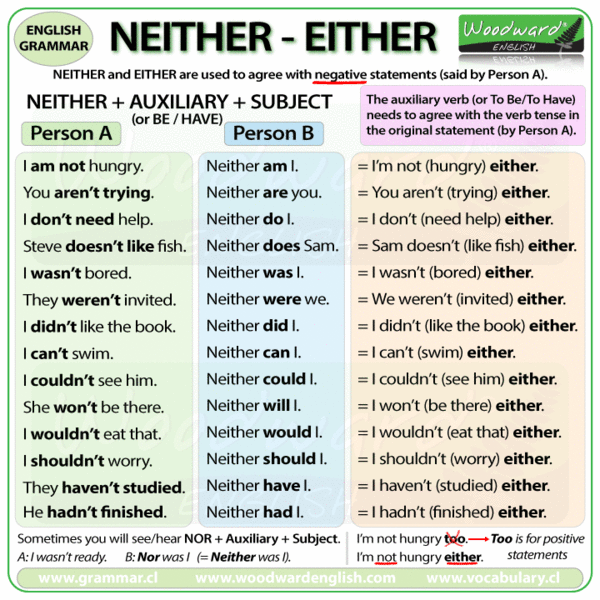
Neither và Either trong tiếng Anh không đơn giản chút nào. Hãy cùng tìm hiểu và ghi nhớ cách dùng thế nào cho đúng nhé các bạn.
Neither, neither … nor and not … either
Neither as a determiner
Neither allows us to make a negative statement about two people or things at the same time. Neither goes before singular countable nouns. We use it to say ‘not either’ in relation to two things. Neither can be pronounced /ˈnaɪðə(r)/ or /ˈni:ðə(r)/.
Neither parent came to meet the teacher. (The mother didn’t come and the father didn’t come.)
Neither dress fitted her. (There were two dresses and not one of them fitted her.)
We use neither of before pronouns and plural countable nouns which have a determiner (my, his, the) before them:
Neither of us went to the concert.
Neither of the birthday cards was suitable.
> Spoken English:
In formal styles, we use neither of with a singular verb when it is the subject. However, in informal speaking, people often use plural verbs:
Neither of my best friends was around.
Neither of them were interested in going to university.
In speaking, we can use neither on its own in replies when we are referring to two things that have already been mentioned:
A:Mike, which would you prefer, tea or coffee?
B:Neither thanks. I’ve just had a coffee.
Neither … nor
We can use neither as a conjunction with nor. It connects two or more negative alternatives. This can sound formal in speaking:
Neither Brian nor his wife mentioned anything about moving house. (Brian didn’t mention that they were moving house and his wife didn’t mention that they were moving house.)
Neither Italy nor France got to the quarter finals last year.
The less formal alternative is to use and … not … either:
Italy didn’t get to the quarter finals last year and France didn’t either.


Leave a Reply